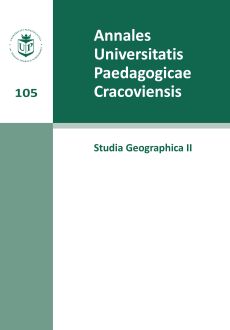What is a „geographical sense”?
Keywords:
Wacław Nałkowski, geographical sense, geography, synthesis of knowledge, psychology, epistemologyAbstract
„Geographical sense” is one of the original ideas of Wacław Nałkowski. He defined it as oneof the characteristics of human perception and thinking, which manifests itself in such a way, that the whole variety of human experience is transformed in the act of perception to shape the overall, general and comprehensive situations or figures. It is a process based on a spontaneous, unconscious selection of incoming sensory data and its evaluation, interpretation and synthesizing, to create the picture of a whole (germ. Gestalt). This process was examined and described by psychologists in the twentieth century. According to Nałkowski, if this holistic perception and valuation refers to geographic features such as places, regions or landscapes, it can be called „geographical sense”. This specific human capacity Nałkowski defined only in one of his latest publications, but its influence on his work seems to be evident already in first editions of his textbooks. The article presents the relationship between the concept of „geographical sense” and the idea of the unity of geography, which seems to be the most important in all Nałkowski’s geographical works. Moreover, the author showed some similar concepts which appeared in the history of geographical thought. „Geographical sense” is compared with the „Excellency of Geography” formulated by Bernhard Varenius, the „spiritual synthesis” by Wincenty Pol, the „geographical thinking” concept of Mikołaj Barański, and particularly, with David Lowenthal’s „geographical epistemology”. The particular attention was paid to the interpretation of „geographical sense” in terms of psychology and cognitive science (J. Piaget and J. Bruner), and also in terms of Kantian epistemology. The article is also a reference to contemporary philosophical concept referred to as the „Basic Furniture of Mind Hypothesis”.
References
Barański N.N., 1957, Co należy rozumieć pod pojęciem geograficznego myślenia, [w:] T. Żebrowski (red.), Teoretyczne zagadnienia geografii: geografia regionalna, „Przegląd Zagranicznej Literatury Geograficznej”, z. 1, s. 89–90.
Bergsten K.E., 1988, Geography: my inheritance, [w:] T. Hägerstrand, A. Buttimer (red.), Geographers of Norden. Reflections on career experiences, „Lund Studies in Geography”, Ser. B, Human Geography 52, Lund University Press, Lund, s. 61–70.
Bruner J.S., 1978, Poza dostarczone informacje: studia z psychologii poznania, PWN, Warszawa.
Goethe J.W. von, 1962, Faust, tłum. F. Konopka, PIW, Warszawa.
Kant I., 1986, Krytyka czystego rozumu, t. I i II, tłum. R. Ingarden, PWN, Warszawa.
Kish G., 1978, A Source Book in Geography, Harvard University Press, Cambridge, Mass.
Kołodziejczyk S.T., 2006, Granice pojęciowe metafizyki, Wyd. Uniwersytetu Wrocławskiego, Wrocław.
Lowenthal D., 1961, Geography, Experience and Imagination: towards a Geographical Epistemology, Annals of the Association of American Geographers, 51, s. 241–260.
Nałkowski W., 1925, Zarys metodyki geografii, wyd. III, M. Arct, Warszawa.
Nałkowski W., 1968, Dydaktyka geografii, oprac. G. Wuttke, PZWS, Warszawa.
Piaget J., 1977, Dokąd zmierza edukacja?, tłum. M. Domańska, PWN, Warszawa.
Pol W., 1850, Rzut oka na umiejętność geografii ze stanowiska uniwersyteckiego wykładu, [w:] W. Pol, Dzieła, t. VI, Rocznik Towarzystwa Naukowego, Kraków, s. 119–138.
Downloads
Published
Issue
Section
License
The submission of a paper to be published is synonymous with an agreement to transfer the copyright free of charge from the author to the publisher. The author also agrees to permit the publisher to publish the paper in printed form, open access online form, digital library form and other digital platforms with which the publisher has or will have a publishing agreement. Furthermore, the author agrees to not limit the number of copies that may be printed or issued by the publisher. In the case of co-authored papers, it is assumed that the corresponding author is authorized to represent the remaining co-authors in this respect. Authors are requested to sign a copyright declaration.

